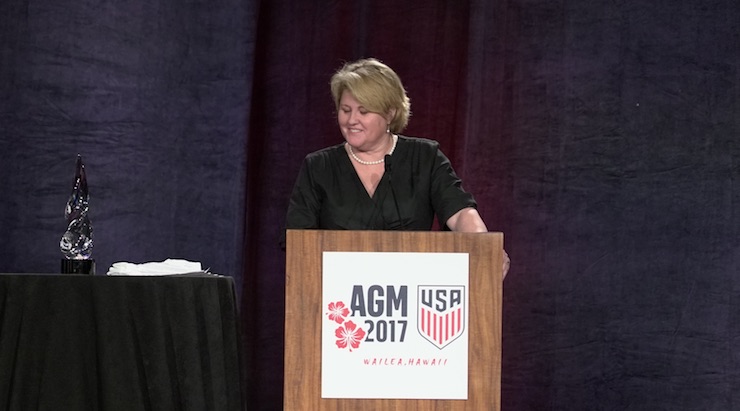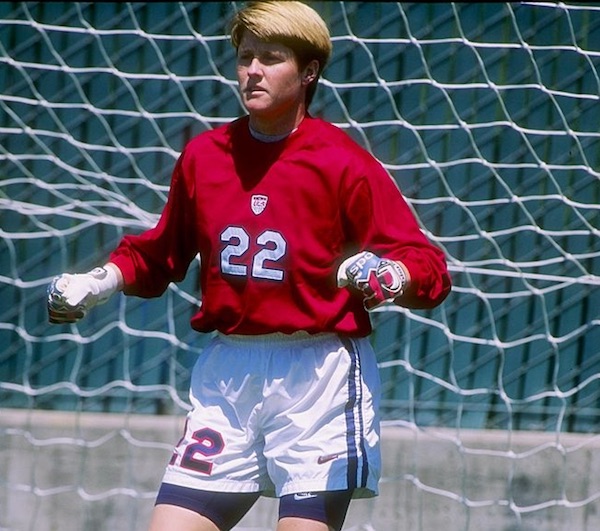Women In Soccer – An Amazing Trendsetter Recognized
As U.S. Soccer’s highest honor, the Werner Fricker Builder Award is given to those who shape the future of soccer in the United States by their incredible contributions to the game. Harvey becomes the first woman to receive the award since its inception in 2002.
Mary Harvey is and has always been a trendsetter. Warm, vivacious and effortlessly honest — this 1991 FIFA Women’s World Cup champion — took to the stage at the U.S. Soccer AGM in Hawaii to become the first women ever to be earn the prestigious Werner Fricker Builder Award.
This former U.S. Women’s National Team goalkeeper is also the 1996 Olympic gold medalist and longtime advocate for the sport.
Named the 2017 winner of U.S. Soccer’s most prestigious award, Harvey was so emotionally moved while accepting her award that — as tears fell down her cheeks — she confided in the audience that she knew before she came up to the podium that there was a good chance she would cry.
After a moving tribute from her former teammates and coaches, Harvey received three standing ovations.
“Any contributions I’ve made since playing is my way of expressing a love of the game that has given me so much,” says Harvey.
U.S. Soccer President Sunil Galati gave Harvey a warm welcome at the AGM, saying, “Mary’s determination over the past three decades has paved the way for the advancement of youth and women’s soccer, not only in the United States but across the world. Her work reflects her passion for the game, which transcends the sport to our everyday society. Her legacy as an all-star on and off the field will be cemented into U.S. Soccer’s foundation for many years to come.”
“I am honored and humbled to receive this award, and to be selected by a committee of such esteemed builders of the sport themselves,” said Harvey.
As the first women ever to receive this award, Harvey says, “It’s humbling to be sure! There are so many women who have given so much to growing soccer in the United States, and hope that there will be many more women after me who will also receive this recognition.”
Struggling against gender bias is often experienced by women in the world of soccer. California native Harvey is no stranger to being a woman in the male dominated soccer world. If the 5’10” goalkeeper could stand in front of the net and protect her USA team from being scored on, she could stand in a room full of men and be heard without hesitation.
“When I went to work for FIFA in 2003, it was the first time that I was in a situation where I was the only woman in most of the meetings I attended,” says Harvey.
“While this took some getting used to, I began to also appreciate this was an adjustment for everyone, not just me. That realization gave me patience and compassion to go through the ups and downs. It was the beginning of change at FIFA, and someone had to be on the front line of that change.”
“What I’m just so proud of – and grateful for – is that since I joined, there are more women occupying senior positions at FIFA, which will only make our sport better and stronger,” says Harvey.
What advice does Harvey have for other women in the front lines of soccer who want to be successful in their careers?
“I would recommend to definitely pursue opportunities because the sport needs you, but know, going in, that you are going to need to be resilient,” says Harvey.
“You will likely have to ask for what you want or need, often times more than once.” admits Harvey.
“But we offer enormous value to the sport and it will benefit tremendously from having more women involved in all areas.”
“The good news, is that the workforce is filled with thousands of Title IX athletes who love the sport and always have. If the sport can attract more of these women, who have perhaps started their careers in other industries, we will be better and stronger for it,” says Harvey.
What was Mary Harvey like as a soccer player?
 “There were so many things I liked about Mary Harvey,” says Anson Dorrance, former coach of the U.S. Soccer Women’s National Team in 1986 and now Head Coach at the University of North Carolina.
“There were so many things I liked about Mary Harvey,” says Anson Dorrance, former coach of the U.S. Soccer Women’s National Team in 1986 and now Head Coach at the University of North Carolina.
“Obviously, the classic descriptions of athletes who make it to this level include hard working, competitive, single minded — but to really get into her core, I would say her psychological resilience was my favorite Harvey quality.”
“You see, we had other, excellent goalkeepers who were more fully embraced by my team and Mary knew this — but it did not derail her.”
“Harvey had a hardness that I really admired,” said Torrance. “She paid me back with her performance in the 1991 World Championship. Harvey embraced me again when she came back to Chapel Hill for her ACL reconstruction surgery and asked to stay with me and my wife … I know that might seem like a small thing, but it meant the world to me.
“Harv was a great teammate,” says Lesle Gallimore, Head Coach of the University of Washington. “Reliable, fun to poke fun at, a good sport and a true competitor! She has always been hardworking and a team first person. It doesn’t surprise me at all that she has earned this award. She is a leader and continues to give back to the game that we all love and has given all of us so much.”
Mary Harvey’s Soccer Career Highlights:
A member of the U.S. Women’s National Team from 1989-1996, Harvey played a pivotal role in the USA’s first Women’s World Cup title at FIFA’s inaugural world championship for women’s soccer in 1991.
With Harvey’s help, the USA set the standard for future U.S. teams, defeating Norway, 2-1 in the title game.
According to U.S. Soccer, “Harvey played every minute of all six games in goal and recorded three shutouts. She finished her National Team career in 1996 on a high note after winning a gold medal at the 1996 Olympics in Atlanta, Georgia.”
Harvey was elected to the U.S. Soccer Board of Directors in 1992 and served as a players’ representative for 11 years. Harvey established the U.S. Soccer Athletes’ Council and headed the task force charged with writing the U.S. Soccer Player Bill of Rights.
Harvey joined FIFA in 2003 and was the first woman to oversee a quadrennial budget of $640 million and a team of 70 people in 13 FIFA offices around the globe. During this time, Harvey also established the U-17 Women’s World Cup.
Always a champion of women’s soccer, Harvey was the Chief Operating Officer for Women’s Professional Soccer from 2008 to 2010.
More recently, Harvey founded the Ripple Effect Consulting, a consultancy for organizations using sport to drive social and environmental change. From the #WomenInFIFA campaign to inspiring the dreams of young women around the planet — Harvey is an inspiration and a mentor deserving of this great recognition.
What is the U.S. Soccer Werner Fricker Builder Award?
As U.S. Soccer’s highest honor, the Werner Fricker Builder Award is given to an individual or group of individuals who dedicate at least 20 years of service to the sport, working to establish a lasting legacy in the history and structure of soccer in the United States. The award recognizes those who have developed programs that will outlast their own involvement in the sport.
“It is particularly meaningful to receive the award bearing Werner Fricker’s name,” says Harvey.
“A giant of the game, Werner was the President of the Federation when I first made the National Team, and I had the pleasure of serving with him on the U.S. Soccer Board of Directors.”
Other WERNER FRICKER BUILDER AWARD recipients include Werner Fricker Sr., Sunil Galati, Gerhard Mengel, Sal Rapaglia, Francisco Marcos, Bob Ganser, Alan Rothenburg, Bob Contiguglia, Kevin Payne, Hank Steinbrecher, Richard Grob, Bruce Arena and Anson Dorrance.
For more information: U.S. Soccer – U.S. SOCCER NAMES MARY HARVEY 2017 WERNER FRICKER BUILDER AWARD WINNER
Images of 2017 U.S. Soccer AGM – Photo Credit: Ali Gollestani






